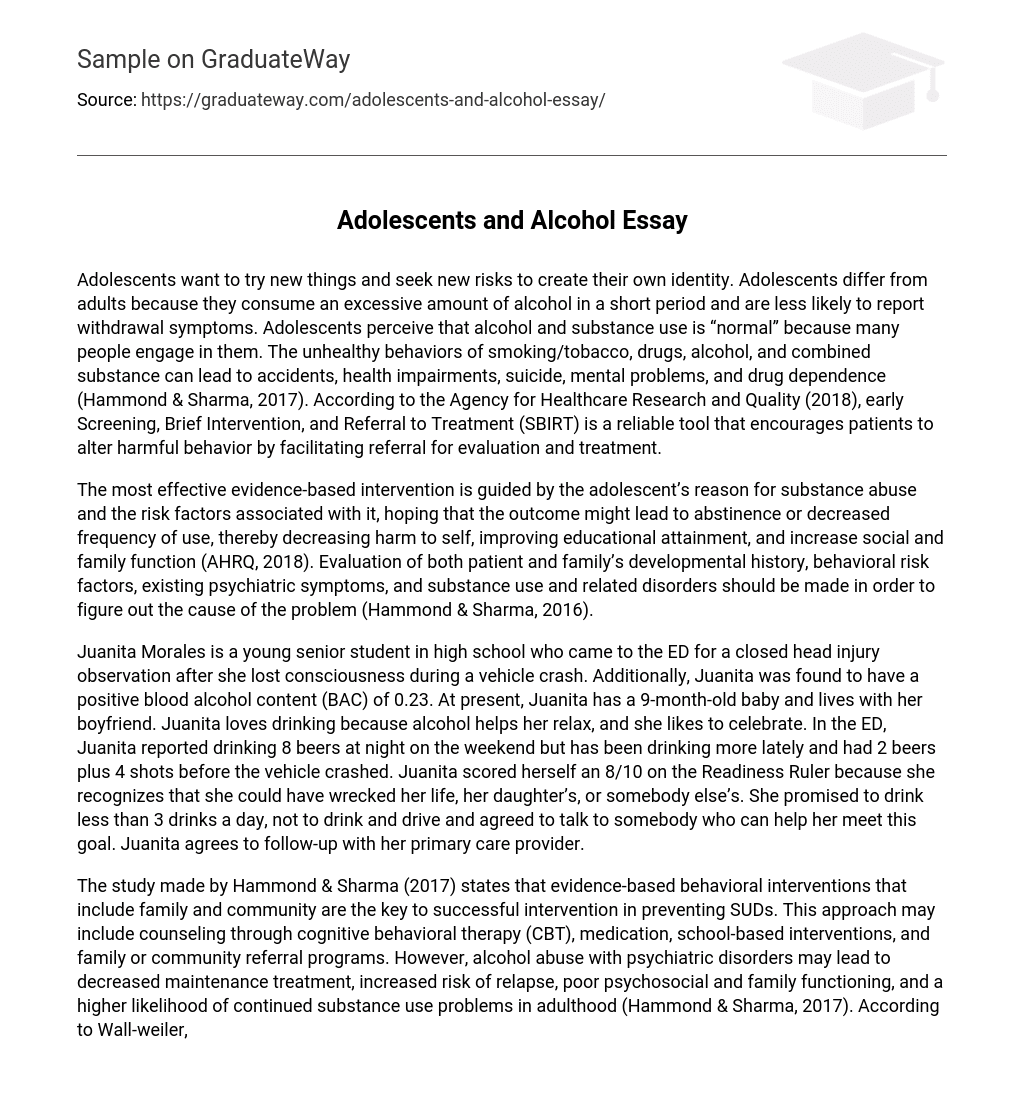Adolescents want to try new things and seek new risks to create their own identity. Adolescents differ from adults because they consume an excessive amount of alcohol in a short period and are less likely to report withdrawal symptoms. Adolescents perceive that alcohol and substance use is “normal” because many people engage in them. The unhealthy behaviors of smoking/tobacco, drugs, alcohol, and combined substance can lead to accidents, health impairments, suicide, mental problems, and drug dependence (Hammond & Sharma, 2017). According to the Agency for Healthcare Research and Quality (2018), early Screening, Brief Intervention, and Referral to Treatment (SBIRT) is a reliable tool that encourages patients to alter harmful behavior by facilitating referral for evaluation and treatment.
The most effective evidence-based intervention is guided by the adolescent’s reason for substance abuse and the risk factors associated with it, hoping that the outcome might lead to abstinence or decreased frequency of use, thereby decreasing harm to self, improving educational attainment, and increase social and family function (AHRQ, 2018). Evaluation of both patient and family’s developmental history, behavioral risk factors, existing psychiatric symptoms, and substance use and related disorders should be made in order to figure out the cause of the problem (Hammond & Sharma, 2016).
Juanita Morales is a young senior student in high school who came to the ED for a closed head injury observation after she lost consciousness during a vehicle crash. Additionally, Juanita was found to have a positive blood alcohol content (BAC) of 0.23. At present, Juanita has a 9-month-old baby and lives with her boyfriend. Juanita loves drinking because alcohol helps her relax, and she likes to celebrate. In the ED, Juanita reported drinking 8 beers at night on the weekend but has been drinking more lately and had 2 beers plus 4 shots before the vehicle crashed. Juanita scored herself an 8/10 on the Readiness Ruler because she recognizes that she could have wrecked her life, her daughter’s, or somebody else’s. She promised to drink less than 3 drinks a day, not to drink and drive and agreed to talk to somebody who can help her meet this goal. Juanita agrees to follow-up with her primary care provider.
The study made by Hammond & Sharma (2017) states that evidence-based behavioral interventions that include family and community are the key to successful intervention in preventing SUDs. This approach may include counseling through cognitive behavioral therapy (CBT), medication, school-based interventions, and family or community referral programs. However, alcohol abuse with psychiatric disorders may lead to decreased maintenance treatment, increased risk of relapse, poor psychosocial and family functioning, and a higher likelihood of continued substance use problems in adulthood (Hammond & Sharma, 2017). According to Wall-weiler, Roos, & Nickel (2016), teenage mothers have more mental issues because they lack the experience in deciding what is right and wrong. The child might grow and turn out to be like the mother given the same environment.
A healthcare provider should be capable of working with community partners that support substance use programs and teach them the necessary skills to effectively resist peer and media pressure to drink alcohol, smoke, or use drugs (Das, Salam, Arshad, Finkelstein, & Bhutta, 2016). Adolescents can be taught to avoid or deal successfully with these situations. Because most adolescents think that smoking, drinking, and using certain drugs are reasonable, the information should be presented in schools and community centers, showing the prevalence of the local community (Das et al., 2016). Furthermore, it should be stressed that substance use is not considered acceptable. Instead, education should be emphasized that the early use of harmful substances, would only lead to adulthood disorders (Hammond & Sharma, 2017).
Adolescents such as Juanita, who use alcohol to relax and celebrate should be taught skills to resist interpersonal influences, general problem-solving and decision-making skills, skills for increasing discipline and self-confidence, strategies for stress relief through relaxation techniques, and general social skills and general assertive skills (Das et al., 2016). For example, Juanita can be enrolled in CBT. CBT is a treatment tool that can modify cognitive distortions by suggesting new and effective methods of thinking about themselves and their surroundings, thus creating positive changes in behavior (Das et al., 2016). Moreover, the skills mentioned can be applied to daily life challenges and can be done in workshops or as community services through assisted discussions, structured small team activities, and role-playing scenarios, videos, and student worksheets to stimulate participation.
If there is a problem with family communication, a referral can be made to health educators who can conduct follow-up telephone calls to address issues related to SUD (Das et al., 2016). The research further states that health educators can help families improve parental supervision, family assistance, establish rules, and communication. Activities can be tailored to individual and family participation. Useful and practical parenting skills, combined with coordinated and comprehensive programs in the community, will help adolescents become better and responsible adults (Das et al., 2016; Hammond & Sharma, 2018). If the combined intervention of family, behavioral, and community intervention does not work, Juanita might need an adjunctive addiction drug treatment.





